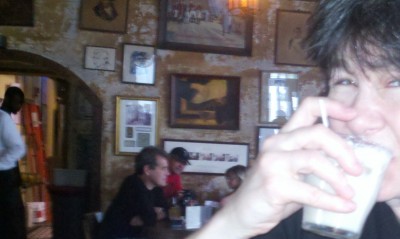New Orleans, LA – There’s a crowded ghost tour passing outside our Royal Street door, a string of college students clutching plastic dacquiri cups, a heavyset couple who trudge past, their pasty pale winter legs bare beneath baggy shorts.
Inside one of the French Quarters grand courtyards we hear the hum of an air conditioner and the stready trickle of the courtyard fountain.
This is Lee Brasseaux’s world.
He’s a chain-smoking Cajun with gentlemanly manners and the slightest of drawls, here from the flat plains of Abbeville, LA. For the past 22 years he’s made his living cleaning and caring for some of the Quarters loveliest homes.
Within the Vieux Carre, there is a disregard for class distinctions, he explains, so you can iron the shirts of the friend who later invites you to dinner. He counts among his best friends a collection of doctors, lawyers, realtors, waiters and noted local cook and author Carol Allen, whose courtyard we eat in tonight. She is at the opera while we borrow her dishes and cutlery.
“The Creoles celebrated life,” he says, a spirit that extended to embracing the mix of cultures in the original Quarter. “We had things like the Quadroon Ball. It was very foreign to everybody else. Even though we’re a part of the United States we retain that sense of being different.”
We’ve begun the evening at the nearby Verti Marte Deli, on Royal Street, a rather unremarkable corner shop that has just reopened after a grease fire in the kitchen shuttered it for eight months. Rumor has it the staff went outside for a smoke while the fire took off.
The regulars scribbled odes to the deli on the plywood that was tacked over the windows during reconstruction: “I will be the first in line for the bread pudding” and “please come back. I miss my chicken Creole,” and simply: “I’m hungry.”
Lee does not cook, unless you count mac ‘n cheese.
“This is what a lot of the locals do,” he says. “I work long hours. I’m single. I don’t have a lot of free time.”
For $10 we pick a main course from Creole favorites that tonight include jambalaya and and a catfish fillet with crab stuffing. Lee, who is lean with chiseled high cheekbones, orders the enormous crabcakes, which come two to a single order, with two sides. He picks the mac ‘n cheese, a long spaghetti noodle with a Velveeta-orange sauce on top and held together with a yellow cheese sauce. Our vegetable is a corn niblet, buttery and stewed with bits of green peppers and a load of salt.
Tourists peer through the glass while we wait for our order to be heated, and Lee waves them in. “It’s good,” he says, with one more exaggerated wave.
They laugh and move on.
Curtis Quate, the Verti Marte’s delivery guy off and on for the past three years, hangs out at the register, happy to be back to work. “I sat on the couch with my mother for six months. All we did was watch movie after movie after movie. She had the best lawn in town.”
It is a different New Orleans behind the grand wooden doors at Carol’s home. We sit at an old cast-iron garden table and split a bottle of pinot noir. The mosquitoes are out and we swat at our bare wrists and legs. The crabcake is heavily breaded, but tasty. I nibble at the greens and ponder my cholesterol level.
“How on earth do you stay so thin?” I ask, as Lee takes the barely touched pound of mac ‘n cheese off my plate and consumes it with relish.
“I don’t have a car,” he says. “I walk everywhere.”
Lee was in France, tending Carol’s chateau, when Hurricane Katrina hit. They sat in front of the TV and wondered what they would find back home. He came back to the States and stayed with friends in New York for almost two months. His small apartment was spared.
We refill our glasses, the wine kicks in, the bugs have left us alone.



